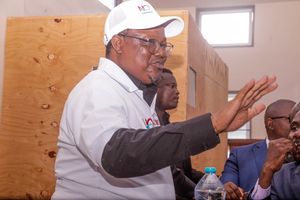Good news for soybeans farmers to effectively utilise Chinese market

Agra is already bearing fruit in the southern regions where people are turning to farming. PHOTO | FILE
What you need to know:
- Kikwete is currently on a tour of Iringa, Mbeya, Katavi and Tabora regions in his capacity as a member of the board of directors of the Alliance for a Green Revolution in Africa (Agra).
Mbeya. Tanzania needs to upscale its production of strategic crops, such as soybeans, for the local and international markets - thus effectively making a headway into the lucrative Chinese market, former President Jakaya Kikwete (2005-2015) has said.
Mr Kikwete challenged stakeholders to improve soybeans farming in Mbeya, Njombe, Ruvuma, Iringa and other parts of the southern highland regions to meet and expand the current annual exports of 300,000 tonnes to China.
Mr Kikwete is currently on a tour of Iringa, Mbeya, Katavi and Tabora regions in his capacity as a member of the board of directors of the Alliance for a Green Revolution in Africa (Agra).
“A hectare of soybeans yields up to one tonne, which means about 300,000 hectares could produce enough for the Chinese market. We need to work together to introduce more farmers into soybean farming,” he said, lamenting cases of agro-processing industries operating below capacity due to inadequate raw material supplies.
Between 2017 and 2021, Agra worked with diverse partners to link farmers to input and output markets, increasing maize, beans and soybean production in Iringa, Njombe and Ruvuma Regions.
In the tour, Mr Kikwete is accompanied by the deputy minister for Agriculture, Mr Anthony Mavunde, Agra Tanzania Country manager Vianey Rweyendela, Agra’s Vice President for innovation and delivery programmes, Agnes Asiimwe Konde, as well as private and public sector stakeholders.
The chief executive officer of the Southern Agricultural Growth Corridor of Tanzania (Sagcot), Mr Geoffrey Kirenga, called on agricultural stakeholders to continue promoting the adoption of improved technologies to improve efficiency and quality of produce - and remain competitive.
During the tour of Mbeya, the delegation visited Raphael Group Limited, a rice miller in Mbeya Town, who also deals in beans, sorghum, groundnuts, sunflower and maize.
The Raphael Group is a key market, buying produce from over 42,000 small-scale farmers, some of whom have been supported by Agra, through the Sagcot initiative titled Integrated Knowledge and Information for Agriculture (SIKIA), which has been critical in empowering rice farmers to increase yields and incomes.
“I value smallholder farmers. I am one of them. I work with them. I started from very low, with a small store where I could only keep eight bags of maize,” Raphael Simon Ndelwa, the CEO of Raphael Group, told the delegation.
The company provides warehousing facilities to smallholder farmers who need storage for at least 10 bags of produce.
At the Meru Agro-seed Multiplication Farm in Mbozi-Songwe, Mr Kikwete hailed the homegrown company for enabling smallholder farmers’ access quality seeds. The firm previously received support from Agra to increase its maize seed multiplication capacity to over 3000 tonnes per season.
The former President’s delegation also visited Mpui Saccos/Amcos, a farmers’ organisation with over 1,000 members that has benefited from Agra’s initiative to increase production. Deputy Agriculture Minister Anthony Mavunde pledged to send experts from the ministry to work with the farmers on accessing quality sunflower seeds.




